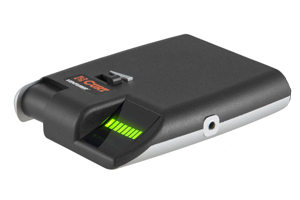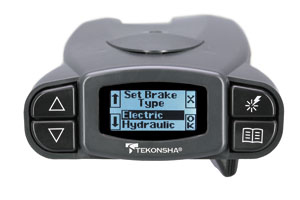The following sponsored post by Hitchanything is full of great information on brake controllers:
So you’ve got a trailer and a hitch. What other trailer accessories do you need before you’re ready to tow? Well, you don’t want to tow anything without a brake controller. Trust us on this one.
Simply put, a brake controller supplies power from the tow vehicle directly to the trailer’s brakes. No matter whether you’re towing a heavy piece of equipment or a small trailer to help your kids move to college, brake controllers are available with a wide variety of options and functions to fit any of your towing needs. In many instances, a properly calibrated brake controller can mean the difference between a successful tow and disaster. More than that, in severe weather or road conditions it can mean the difference between life and death. So as you can see, purchasing a brake controller can be a big decision.
When looking at brake controllers, there are a lot of factors to consider like price, safety and ease of installation. Throw in the different types of controllers along with the possible extra features and it can become completely overwhelming. We understand that. It’s why we’ve done our best to break down everything you need to know about brake controllers. In the following article, you’ll see how they operate, how they’re installed, and what you need to know to make sure they’re running properly.
Brake controllers are one of the most important trailer accessories that you can purchase. They help keep you, your vehicle and your trailer safe. In fact, a good brake controller isn’t just a luxury or extra, it’s the law.
All 50 state require brakes on trailers with gross vehicle weight ratings (GVWR) greater than 3,000 lbs. and some even have requirements for around 1,000 lbs. Make sure that you check your state’s regulations if you plan to tow anything.
Without proper brake controllers on a trailer, there is significantly less handling capability when towing, as both the towing vehicle and the trailer can become difficult to keep under control. Dangerous weather conditions, slippery roads, or situations that require fast stops can all be made even more hazardous without a proper brake controller on your trailer. Aside from these obvious safety factors, it’s also important to note that no matter what vehicle you’re using to tow, its brakes were not designed for the heavier loads that towing entails. Without a proper brake controller, your truck or towing vehicle can end up with overheated and damaged brakes.
So now that you understand why a good brake controller is a requirement for safe towing, let’s examine the different types of controllers that are available: time delayed and proportional.
 Time delayed brake controllers are programmed by the user with a predetermined amount of braking power; when the towing vehicle’s brakes are engaged, that pre-programmed level of power is then sent to the trailer’s brakes as well.
Time delayed brake controllers are programmed by the user with a predetermined amount of braking power; when the towing vehicle’s brakes are engaged, that pre-programmed level of power is then sent to the trailer’s brakes as well.
Use of a time delayed brake controller gives you complete control over the amount of braking power in your trailer. This allows you to take into account the weight of your load, the length of your trip, your speed, and even the condition of the roads you’ll be taking. When you’re planning your trip, you can always change the amount of power applied to your trailer brakes based on terrain or speed.
Time delayed brake controllers are often preferred by two groups of people: those who tow lighter loads once or twice a year and commercial drivers. Why is this the case? Well, towing lighter loads on well-maintained roads or only towing a couple of times a year is the ideal situation for a time delay brake controller. They are easy to install and maintain with little calibration. You can just set it and go. The reason commercial drivers have been known to prefer time delay brake controllers is because they usually have preset speeds on their trips. This allows them to program their controller to match their speed and they can regulate it according to the kind of conditions in which they’ll be driving. It gives them more control over how the brakes are applied on their trailers.
It is important to note that the time delayed brake controller is designed to stay within the presets that you program. This means that if you need to stop quickly or apply the brakes outside of those parameters, the trailer’s brakes will not respond to this urgency. If you think that you would prefer a more organic, sensor based system, consider a Proportional Brake Controller.
 Proportional brake controllers use sensors and inertia to determine how quickly the tow vehicle is stopping and apply an equivalent amount of power to the trailer brakes. When the brakes are engaged in the tow vehicle, a pendulum sensor swings forward and measures both speed and braking power. It then matches the trailer’s brakes to that of the towing vehicle, making the trailer and the vehicle work in sync.
Proportional brake controllers use sensors and inertia to determine how quickly the tow vehicle is stopping and apply an equivalent amount of power to the trailer brakes. When the brakes are engaged in the tow vehicle, a pendulum sensor swings forward and measures both speed and braking power. It then matches the trailer’s brakes to that of the towing vehicle, making the trailer and the vehicle work in sync.
If you have slippery road conditions or end up in a fast braking situation, a proportional brake controller will control the brakes on the trailer to match that of the towing vehicle. For many, this is a comfortable option because it makes the trailer more of an extension of the towing vehicle. A slow stop in the truck will mean a slow stop on the trailer brakes as well. Likewise, an emergency stop can be conducted faster for both the trailer and the towing vehicle.
Using a proportional brake controller usually provides a smoother ride and has been shown to create less wear and tear on the brake systems of both the trailers and the towing vehicle.
There you have it. Hopefully this helped you understand the difference between the two types of brake controllers. Of course, if you have any questions you can always call or shoot us an email. Happy Camping!
http://www.hitchanything.com/buying-a-brake-controller.html
Well, I definitely learned something by the above post and hope you find the information helpful as well.
Carol Ann

I agree that getting the right brake controller for your trailer is important. You made a really good point about how your car’s breaks were not designed to handle the additional weight a trailer may add when trying to stop, particularly in bad weather. My husband and I are getting a new trailer soon. I think it is big enough that it should have its own breaks. I’ll bring this up when we buy it.
Thanks Kairi – glad to help. Good luck with your new purchase.
Your welcome Chad – we do try!